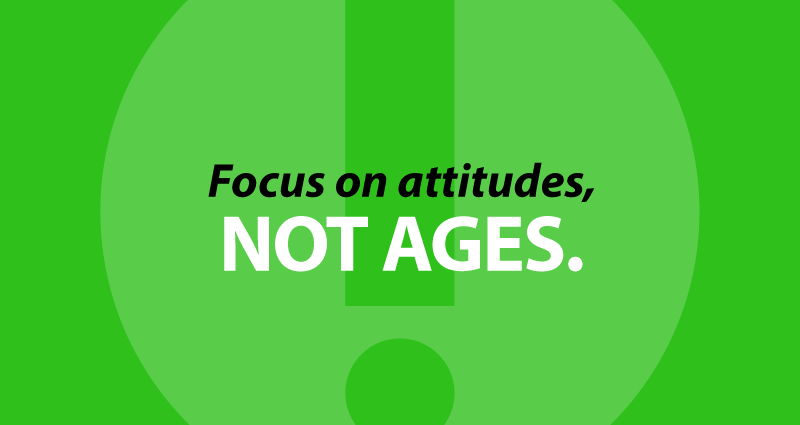
Why you should stop marketing to Millennials
Now wait a minute! Aren’t Millennials where all of us are supposed to be focusing our marketing? Why would I stop marketing to Millennials?
After all, there are 80 million of them, with $200 billion in annual buying power. They’re obviously the hottest generation to target because they will need multiple auto loans, credit cards, and maybe a few mortgages in their future.
Well, while everyone seems to be marketing to millennials, here are a few stats that may surprise you:
- By 2020 there will be more 55-year olds than 5-year olds
- By 2035, for the first time ever in the U.S., older adults will outnumber children
- 70% of all available U.S. income is owned by those over 55
It’s a fact that the U.S. is getting grayer, not younger. Americans are living longer and having fewer children, causing a major demographic shift. (If you care to see how your market will change between 2010-2023, take a look at these maps.)
But the last thing I’m suggesting is for you to switch your marketing from millennial to mature.
What I really want to tell you is to stop targeting one or the other.
Focus on attitudes, not ages.
In 2018 a global intelligence division of mega-advertising agency McCann Worldgroup surveyed 24,000 people in 28 markets from Australia to the U.S. They asked everyone how old they felt from a scale of 1 (not old at all) to 10 (I feel very old).
The average answer by participants from every decade, whether they were in their 20’s or 30’s all the way up to those in their 60’s and 70’s?
Five. Right in the middle. In every age group.
So, with no direct correlation between someone’s age and how old they feel, perhaps those age stereotypes need to give way to how people are actually living their lives.
Instead, why not focus on the five attitudinal segments McCann found in every age group?
- AGELESS ADVENTURERS: Life is a journey of limitless opportunities and personal growth
- COMMUNAL CARETAKERS: Life is a time of engaging with community and enriching personal relationships
- ACTUALIZING ADULTS: Aging is a process of maturity and acquisition of adult responsibilities
- FUTURE FEARERS: Aging is a time of anxiety and uncertainty due to risks associated with old age
- YOUTH CHASERS: Aging means a decline and loss of youth and vitality
Just remember that it doesn’t matter if an Ageless Adventurer is 20 or 70, they see life as full of possibilities.
Give your personas an attitude.
Personas are a great way to describe who is the perfect target for your product and message. Base your character on several different people, of all ages, and be sure to give her/him an attitude. The goal is to invent a real, imperfect persona that feels alive, that will do or say things you didn’t really expect or plan.
We’ve recently started helping one of our clients with a series of educational blog posts written for two very different personas. Here are a few excerpts from their descriptions:
- Samantha is a Civil Engineer who specializes in water systems and loves sunshine, mountains and chili peppers. She and her second husband Sam often joke about their similar names, but while Samantha loves hiking and camping, Sam prefers a bit more luxury when they travel. Samantha loves to collect experiences, while Sam has filled their house with sculptures and paintings from local artists.
- Maria is working as an LPN in a local nursing home, but she’s only a few months away from completing her RN. So far, Maria’s father and brother have been able to keep her old Ford on the road, but it’s not in the best shape. Once she graduates and gets a decent job, she plans to buy a safer car, then save up some money so she and her son Ethan can finally move into a bigger apartment closer to town and in a better school district.
By making them feel imperfect and real, you not only build empathy, you also get the chance to show their natural character, their values in action. Sam and Samantha may have similar names, but they allow each other to be themselves. Maria’s old Ford wouldn’t be running if it wasn’t for the close family she has.
Two different life stages, certainly.
But the emphasis is on how they are experiencing life, not just how old they are.
- It’s hard not to get caught up in a buzz that surrounds you. - April 9, 2024
- Turn your staff into an Idea Factory. - February 27, 2024
- Move with the future or get left behind - February 6, 2024
